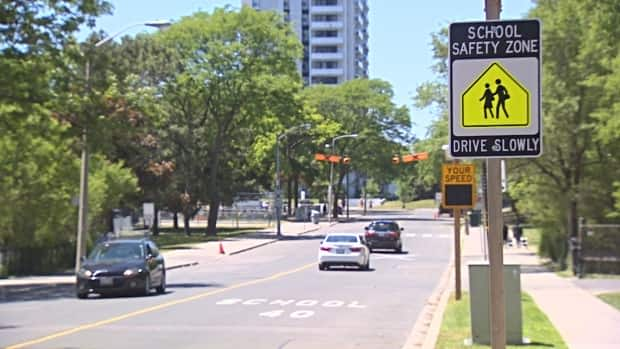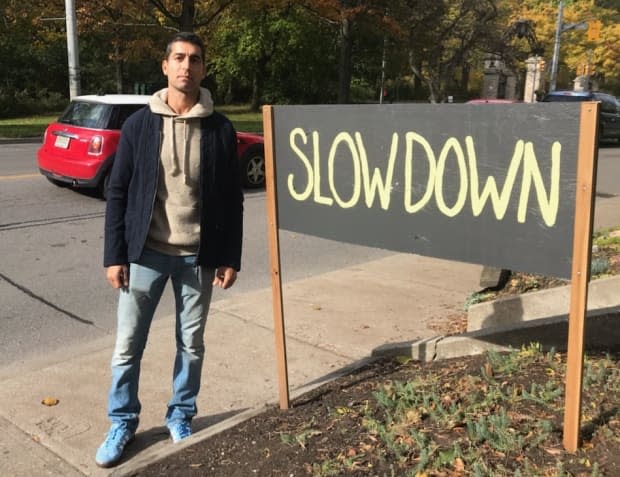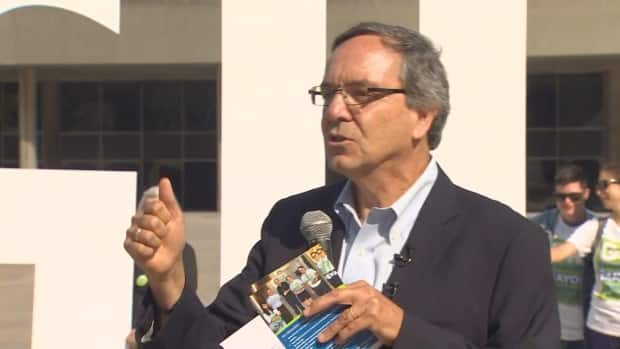Dangerous roads and slow progress: Road safety becomes issue on Toronto campaign trail

Eleven-year-old Anton Dunbar isn't eligible to cast a ballot in Toronto's upcoming municipal election, but if he could, road safety would likely determine his vote.
"A lot of the places, there are no bike lanes and there's nowhere where we can feel safe," Anton told CBC Toronto.
"I think [the next mayor] should make it a priority to have bike lanes and safe streets for kids and everybody."
Anton and his mother spoke to CBC at the Light Up Toronto for Safe Streets rally on Sunday, where more than 100 people walked and cycled from Ramsden Park in Rosedale to Yonge-Dundas Square.
The day before, hundreds of cyclists took to Toronto streets to protest against the shutdown of ActiveTO and renew calls for safer streets.
With voting day approaching on Oct. 24, cyclists, pedestrians and advocates are pushing to make road safety a central election issue, arguing more action and resources are needed to make streets safer for all residents.
Vision Zero progress
In 2016, the City of Toronto introduced its Vision Zero strategy with the goal of reducing traffic-related deaths and serious injuries to zero after 78 people died in traffic accidents the previous year.
The Vision Zero initiative originated in Sweden in 1997, where it's been credited with reducing cyclist and pedestrian deaths from 202 in 1990 to 43 in 2020.
In Toronto, the program has seen more than 1,100 stretches of roadway designated as community, school or senior safety zones and more than 1,000 advance walk signals for pedestrians installed at crosswalks.
It's also prompted the redesign and rebuilding of intersections; the construction of new mid-block intersections; and the installation of hundreds of photo radar and red-light cameras meant to catch speeding drivers and those who run red lights, among other measures.
The city has also built 65 km of new cycle tracks, bike lanes, multi-use trails and neighbourhood routes from 2019 to 2021, according to a 2021 staff report.

But progress on the main goal of reducing deaths and injuries has been slow.
While the number of people seriously injured in traffic collisions has declined annually since 2018, the number of people killed each year remains high.
Forty-four people, including 21 pedestrians, seven motorcyclists and one cyclist, have died and 120 people have been seriously injured on Toronto streets so far this year, according to the city's Vision Zero dashboard. That puts the city on track to reach last year's count of 60 deaths.
The Toronto Police Service's traffic unit says more drivers are speeding and disregarding the rules of the road.
"Our numbers are very high," said Const. Sean Shapiro. "We hear often that speed cameras are catching the same driver in the same area multiple times."
Toronto police officers have handed out more than 60,000 speeding tickets, 30,000 aggressive driving tickets and 6,000 distracted driving tickets so far this year.
"Statistically, it's been proven that decreasing speed limits or lower speed limits cause less injury if a pedestrian or cyclist is struck than obviously at greater speeds," added Sgt. Melissa Kulik.
Advocates want more than speed reduction
While research suggests the presence of 50 speed cameras — two in each ward — is prompting drivers to slow down in those areas, advocates are calling for the redesign of more city streets to allow space for cycling and walking.
They also want to speed up the creation of a connected network of separated bike lanes, lower speed limits, better transit and more funding for Vision Zero.
Faraz Gholizadeh, a cycling advocate who lives on Parkside Drive adjacent to High Park, said a speed camera recently installed on his street after two people were killed in collisions hasn't been enough to slow down speeding drivers.
"Speed cameras aren't going to work. The only way you can change street safety is by redesigning the street," he told CBC Toronto at Sunday's rally.

In a statement, the city said building more bikeways is a multi-year process that requires consultation to address concerns from the community and councillors, as well as planning, design and construction work.
In addition, staffing challenges limit the city's capacity to bundle bikeways with existing road rehabilitation projects to 10 km per year.
The city said it's already reduced speed limits on hundreds of kilometres of roadway, and is working now on reducing limits to 30 km/h on all local roads and public lanes in Etobicoke, North York and Scarborough.
But it takes time given a limited number of crews available to install new signs and poles, the city added.
Campaigning for safety
Municipal office-seekers are responding to the calls of those concerned about road safety.
Mayoral candidate Gil Penalosa, widely considered to be one of John Tory's main challengers, criticized the mayor and the city for failing to meet the program's lofty goal.
"The last eight years, it's been wasted years. The city has been talking Vision Zero, but is doing nothing. So it's zero vision," Penalosa told CBC.
In addition to lowering speed limits, Penalosa's platform calls for redesigning the city's 100 most dangerous intersections and allocating money to speed up the construction of bike lanes from the current pace to 75 km per year.

Sarah Climenhaga, another mayoral hopeful, said she cares deeply about safe streets, in part, because her son has been hit by a car.
"Everyone who cycles regularly has a story like that," Climenhaga said. "We just have to make our streets safer."
Climenhaga said, if elected, she would look beyond bike lanes and redesign some road lanes to accommodate people who ride scooters, skateboards and other non-motorized forms of transportation.
In a statement, a spokesperson for Tory defended his record on street safety, saying he led the charge to bring back automated speed enforcement and that the city invested almost $260 million in Vision Zero between 2017-2021, with $64 million in funding allocated this year.
"John Tory is working to ensure we have safe streets for everyone, everywhere across the city and he is the only mayoral candidate who can lead city council and work with the other governments to make sure this road safety work continues," Jenessa Crognali said.

 Yahoo Movies
Yahoo Movies 
